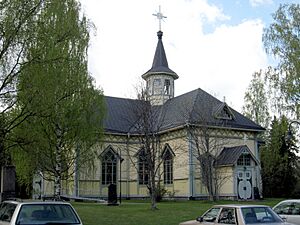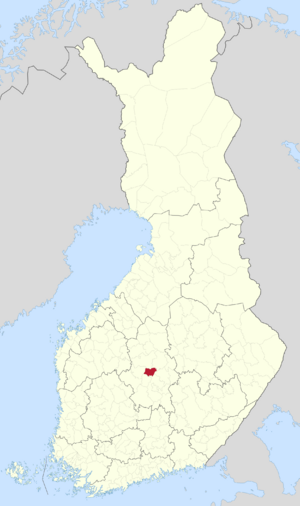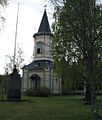Uurainen facts for kids
Quick facts for kids
Uurainen
|
||
|---|---|---|
|
Municipality
|
||
| Uuraisten kunta Uurainens kommun |
||

Uurainen Church
|
||
|
||

Location of Uurainen in Finland
|
||
| Country | ||
| Region | Central Finland | |
| Sub-region | Jyväskylä sub-region | |
| Charter | 1868 | |
| Area
(2018-01-01)
|
||
| • Total | 372.26 km2 (143.73 sq mi) | |
| • Land | 347.98 km2 (134.36 sq mi) | |
| • Water | 24.22 km2 (9.35 sq mi) | |
| Area rank | 221st largest in Finland | |
| Population
(2023-12-31)
|
||
| • Total | 3,615 | |
| • Rank | 201st largest in Finland | |
| • Density | 10.39/km2 (26.9/sq mi) | |
| Population by native language | ||
| • Finnish | 98.3% (official) | |
| • Swedish | 0.1% | |
| • Others | 1.6% | |
| Population by age | ||
| • 0 to 14 | 25.3% | |
| • 15 to 64 | 54.5% | |
| • 65 or older | 20.2% | |
| Time zone | UTC+02:00 (EET) | |
| • Summer (DST) | UTC+03:00 (EEST) | |
Uurainen (Swedish: Uurainen, also Urais) is a municipality of Finland.
It is part of the Central Finland region. The municipality has a population of 3,615 (31 December 2023) and covers an area of 372.26 square kilometres (143.73 sq mi) of which 24.22 km2 (9.35 sq mi), or roughly 6.5%, is water. The population density is 10.39 inhabitants per square kilometre (26.9/sq mi).
Neighbouring municipalities are Jyväskylä, Laukaa, Multia, Petäjävesi, Saarijärvi and Äänekoski.
The municipality is unilingually Finnish.
Etymology
The name Uurainen is derived from the lakes Iso-Uurainen and Pieni-Uurainen. The root word for these lake names is most likely uuro, a dialectal word meaning "riverbed", referring to the Takapuro river between the two lakes, as it has been a strait in the past. Uurainen is also the name of a register village in the municipality.
Geography
Lakes
There are all together 125 lakes in Uurainen. The biggest lakes are Kyynämöinen, Sääkspää and Iso-Uurainen.
Villages
Settlements:
|
|
Register villages:
- Kuukkajärvi
- Uurainen
- Kangashäkki
- Höytiä
- Nyrölä (mostly in Jyväskylä)
History
Six possible Stone Age settlements have been found on the territory of modern Uurainen. Four of these sites are in Kuukkajärvi, one in the village of Uurainen and another one in Höytiä. Evidence for permanent Iron Age settlement has not been found.
The area of modern Uurainen was devoid of a permanent settled population in the Middle Ages. In the 15th and early 16th centuries, these lands were held as hunting grounds by Tavastians. The first settler of Uurainen was Paavo Minkkinen, who in 1548 established a farm named Salmela in the hunting grounds of Heinäjoensuu, owned by the men of the village of Laitikkala in Kulsiala (nowadays in Pälkäne). This area would later become the register village of Kuukkajärvi. Paavo Minkkinen, like almost all settlers of Uurainen, was a Savonian. The Minkkinen family likely originated from Pellosniemi near modern Mikkeli.
The first register villages to be established in the area were Kuukkajärvi and Akonjärvi, both of which were first mentioned in 1561. Akonjärvi was merged into Kuukkajärvi in 1586.
Uurainen was originally a part of the parish of Saarijärvi. It was mentioned in 1741 under the Swedish name Uhrais. The area got its own chapel in 1801 and was variously called Uurainen, Kuukkajärvi, Kuukka and Minkkilä. The area had multiple names as the vicarage (pappila) was located in the register village of Uurainen while the church was located in the village of Kuukkajärvi on the lands of the Minkkilä farm.
Uurainen became a separate parish in 1868, though the separation effectively happened in 1887. The northern part of Nyrölä, which at that time included Höytiä, was transferred from the Jyväskylä parish to Uurainen in 1868.
Gallery
See also
 In Spanish: Uurainen para niños
In Spanish: Uurainen para niños




